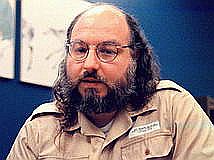

For context, click here for previous postings regarding Jonathan Pollard.
The Man in the Mirror, by David Holzel (The Jewish Angle)
“When the mitzvah of pidyon shvuyim – rescuing captives – was discussed, the two made the connection with Pollard.”
“If in that time and in that place you had been in Pollard’s position, what would you have done? Look into the mirror as you consider that question.”
Excerpts;
I was attending a gathering of Jewish journalists in New York City, when I happened to scan the front page of the New York Times. A headline noted that Jonathan Pollard was to be sentenced that day, and as I read the article, my sense of reality shifted. An American Jew, guilty of one count of passing classified material to Israel, was almost certainly about to receive a life sentence, and not a word of it had been mentioned at this gathering of Jewish newspaper editors and writers.
If there was a story for a Jewish journalist, this was it. It threw a glaring light onto the hyphenated identity of the American-Jew. It raised the question of how far an American Jew would be willing to go to help Israel, if it were in his power to render the Jewish state singular assistance. And it raised a mirror to those who dared to look at a reflection that asked: “We say we revere the martyrs who went to their death saying the Shema, rather than desecrate the name of God. Is that empty sentimentality, or do we truly believe in sticking our necks out for a just cause?”
For all that, not a word from my colleagues. And suddenly my conscience became a clock ticking down the minutes until Pollard was put away for life. All Jews are responsible for each other, we are fond of saying, but I could do nothing to stop that clock ticking down on an American Jew, just four years older than I, a Zionist who wanted to see Israel safe, and who, from his position as an analyst for the U.S. Navy, had passed military information to Israel that the U.S. had withheld.
It soon will be 20 years since that date – March 4, 1987. Jonathan Pollard and I have grown from impetuous young men to something like middle age. We have never met or spoken. But since that day, he has been my shadow. Whenever I have looked for him he is there, in prison.
In those days, when those who called themselves American Jewish leaders, and the organizations they led, were silent about Pollard, I learned that there were three types of Jews who vociferously were not – Holocaust survivors, the Orthodox, and the crazies.
I’ve often wondered why. From experience, Holocaust survivors know that staying quiet and following the rules isn’t always enough when it comes to preserving Jewish lives. Pollard’s willingness to break the law because it could potentially save Jews was exactly what there wasn’t enough of during the Holocaust.
Orthodox Jews are less burdened about what for others is a sense of dual loyalty between their American-ness and their love for Israel. Because their Jewishness is very much on display, many have to stick their necks out to exercise their freedom of religion. That Pollard stuck his neck out for Israel was something to be commended, not condemned.
The crazies, who never fit in anywhere because they can’t or won’t conform, have nothing to lose in speaking up for another marginal figure, Pollard.
Pollard embarrassed most American Jews. He broke the law to help Israel. Having to explain that to other Americans, let alone to the face in the mirror, was just too uncomfortable. Isn’t America a good place for Jews? Isn’t America good to Israel? So how could he have repaid America by passing its secrets to Israel and possibly ruin a good thing? Better he should stay where he is and we forget about him.
Pollard received a sentence disproportionate to the crime he committed.
So it was a surprise, and a relief, to meet two up-and-coming Federation machers in Atlanta, one an attorney and the other a real-estate developer, who were nudging the Jewish community there about Pollard. One of them even visited Pollard where he is being held, at the Federal prison in Butner, North Carolina.
For their trouble, these two men earned the not entirely complimentary nickname “The Pollard Twins.” They were both participants in the Wexner program, a high-intensity program to teach up-and-coming Jewish leaders about Judaism. When the mitzvah of pidyon shvuyim – rescuing captives – was discussed, the two made the connection with Pollard.
Pollard does seem more like a captive than a prisoner. He remains chained by a secret – by a 46-page classified memorandum that then-Secretary of Defense Caspar Weinberger submitted to federal Judge Aubrey Robinson. The public has never been allowed to see this memo, which reportedly outlines the damage Pollard did to American security and which, David Zwiebel writes, “is widely cited as a major reason that the judge ultimately sentenced Pollard to life in prison for espionage.”
The day before Pollard was sentenced, Weinberger submitted an additional memo to the court, in which he accused Pollard of treason.
The accusation was dramatic, but inaccurate. Pollard was not charged or convicted of treason. Worse, to this day the public has not been allowed to see and judge the secret information Weinberger supposedly presented. That we are expected to accept Pollard’s life sentence without hearing a credible reason enlists us in what amounts to a witch hunt.
The witch hunt has had the intended chilling effect. Every judicial appeal, every attempt at clemency for Pollard has failed. And yet I cling to the belief that, whoever else Jonathan Pollard may be, he is a Jew who attempted to help Israel, an American who has been denied justice, and that his punishment far outweighs his crime. He has served his time.
Still, if in that time and in that place you had been in Pollard’s position, what would you have done? Look into the mirror as you consider that question.
To read the entire article, click here.